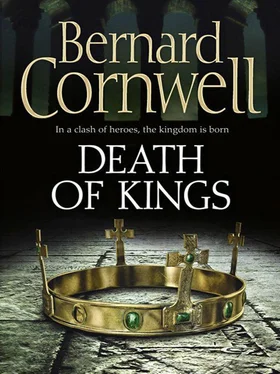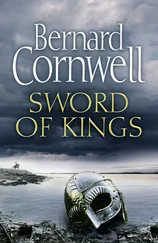Beocca stared into the fire. ‘I always hoped I would see Bebbanburg again,’ he said wistfully, ‘but I doubt that will happen now. The king says you may go to Fagranforda.’
‘Good,’ I said.
‘Alfred was generous to you,’ Beocca said sternly.
‘I don’t deny it.’
‘And I had some influence there,’ Beocca said with a little pride. ‘Thank you.’
‘You know why he agreed?’
‘Because Alfred owed me,’ I said, ‘because without Serpent-Breath he wouldn’t have remained king for twenty-eight years.’
‘Because Wessex needs a strong man in Mercia,’ Beocca said, ignoring my boasting.
‘Æthelred?’ I suggested mischievously.
‘He’s a good man, and you’ve wronged him,’ Beocca said fiercely.
‘Maybe,’ I said, avoiding a quarrel.
‘Æthelred is Lord of Mercia,’ Beocca said, ‘and the man with the best claim to the throne of that land, yet he has not tried to take that crown.’
‘Because he’s frightened of Wessex,’ I said.
‘He has been loyal to Wessex,’ Beocca corrected me, ‘but he cannot appear too subservient or the Mercian lords who crave their own country will turn against him.’
‘Æthelred rules in Mercia,’ I said, ‘because he’s the richest man in the country, and whenever a lord loses cattle, slaves or a hall to the Danes he knows that Æthelred will reimburse him. He pays for his lordship, but what he should be doing is crushing the Danes.’
‘He watches the Welsh frontier,’ Beocca said, as if dealing with the Welsh was an adequate excuse for being somnolent with the Danes, ‘but it is appreciated,’ he hesitated over the word, as if it had been carefully selected, ‘appreciated that he is not a natural warrior. He is a superb ruler,’ he hurried on after those words to stifle any laugh he suspected I would give, ‘and his administration is admirable, but he has no talent for warfare.’
‘And I do,’ I said.
Beocca smiled. ‘Yes, Uhtred, you do, but you have no talent for respect. The king expects you to treat Lord Æthelred with respect.’
‘All the respect he deserves,’ I promised.
‘And his wife will be permitted to return to Mercia,’ Beocca said, ‘upon the understanding that she endows, indeed that she builds, a nunnery.’
‘She’s to be a nun?’ I asked, angry.
‘Endows and builds!’ Beocca said. ‘And she will be free to choose wherever she so wishes to endow and to build the nunnery.’
I had to laugh. ‘I’m to live next door to a nunnery?’
Beocca frowned. ‘We cannot know where she will choose.’
‘No,’ I said, ‘of course not.’
So the Christians had swallowed the sin. I assumed that Edward had learned a new tolerance for sin, which was no bad thing and it meant Æthelflaed was free to live more or less as she wished, though the nunnery would serve as an excuse for Æthelred to claim that his wife had chosen a life of holy contemplation. In truth Edward and his council knew they needed Æthelflaed in Mercia, and they needed me too. We were the shield of Wessex, but it seemed we were not to be the sword of the Saxons because Beocca gave me a stern warning before he left the tavern. ‘The king expressly wishes that the Danes be left in peace,’ he said. ‘They are not to be provoked! That is his command.’
‘And if they attack us?’ I asked, annoyed.
‘Of course you may defend yourself, but the king does not wish to start a war. Not before he is crowned.’
I growled acceptance of the policy. I supposed it made sense that Edward wanted to be left in peace while he established his authority over his new kingdom, but I doubted the Danes would oblige him. I was certain they wanted war, and would want it before Edward’s coronation.
That ceremony would not take place until the new year, giving time for honoured guests to arrange their travel and so, as the autumn mists turned colder and the days shrank, I went at last to Fagranforda.
That was a blessed place of sweet low hills, slow rivers and rich earth. Alfred had indeed been generous. The steward was a morose Mercian named Fulk who did not welcome a new lord, and no wonder, for he had lived well off the estate’s income, helped in that by the priest who kept the accounts. That priest, Father Cynric, tried to persuade me that the harvests had been poor of late, and that the stumps in the woodland were there because the trees had died of disease rather than been felled for the value of their timber. He laid out the documents that matched the receipts I had brought from the treasury in Wintanceaster, and Father Cynric smiled happily at that coincidence. ‘As I told you, lord,’ he said, ‘we held the estate in sacred trust, as it were, for King Alfred.’ He beamed at me. He was a plump man, full-faced, with a quick smile.
‘And no one ever came from Wessex to examine your accounts?’
‘What need was there?’ he asked, sounding surprised and amused at such a thought. ‘The church teaches us to be honest labourers in the Lord’s vineyard.’
I took all the documents and put them on the hall fire. Father Cynric and Fulk watched in speechless surprise as the parchments scorched, curled, cracked and burned. ‘You’ve been cheating,’ I said, ‘and now it stops.’ Father Cynric opened his mouth to protest, but then thought better of it. ‘Or do I have to hang one of you?’ I asked. ‘Maybe both?’
Finan searched both Fulk’s and Father Cynric’s houses and found some of their hoarded silver, which I used to buy timber and to pay back the steward who had lent me money. I have always loved to build, and Fagranforda needed a new hall, new storehouses and a palisade, all projects for the winter. I sent Finan north to patrol the lands between the Saxons and the Danes, and he took new men with him, men who came to me because they heard I was wealthy and gave silver. Finan sent messages every few days, and they all said that the Danes were surprisingly quiet. I had been certain that Alfred’s death would provoke an attack, but none came. Sigurd, it seemed, was sick, and Cnut had no desire to attack southwards without his friend. I thought it an opportunity for us to attack northwards and said so in a message to Edward, but the suggestion went unanswered. We heard rumours that Æthelwold had gone to Eoferwic.
Gisela’s brother had died and been succeeded as king in Northumbria by a Dane who ruled only because Cnut allowed it. Cnut, for whatever reason, had no wish to be king, but his man occupied the throne and Æthelwold was sent to Eoferwic presumably because it was so far from Wessex and so deep inside Danish land, and was thus a safe place. Cnut must have believed that Edward might send a force to destroy Æthelwold, and so hid his prize behind Eoferwic’s formidable Roman walls.
So Æthelwold cowered, Cnut waited and I built. I made a hall as high as a church with stout beams and a tall palisade. I nailed wolf skulls to the gable, which faced the rising sun, and I hired men to make tables and benches. I had a new steward, a man called Herric who had been wounded in the hip at Beamfleot and could no longer fight, but Herric was energetic and mostly honest. He suggested we build a mill on the stream, a good suggestion.
It was while I was searching for a good place to make the mill that the priest arrived. It was a cold day, as cold as the day on which Father Willibald had found me in Buccingahamm, and the edges of the stream were crackling with thin ice. A wind came cold from the northern uplands, while from the south came a priest. He rode a mule, but scrambled out of the saddle when he came close to me. He was young and even taller than I was. He was skeletally thin, his black robe was filthy and its hems caked with dried mud. His face was long, his nose like a beak, his eyes bright and very green, his fair hair straggly and his chin nonexistent. He had the wispiest, most pathetic beard, which dangled halfway down a long, thin neck around which he wore a large silver cross which was missing one of its arms. ‘You are the great Lord Uhtred?’ he enquired earnestly.
Читать дальше
Конец ознакомительного отрывка
Купить книгу












